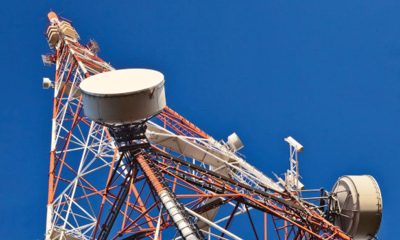Economy
Nigerian Telecoms Sector Viable for More Operators, Investments

The consumption levels of data for Internet connectivity and financial transactions are increasingly mounting pressure on telecoms infrastructure in Nigeria.
The growing smartphone adoption coupled with increasing demand for high-speed Internet is a challenge for operators to reimagine their operations as it holds business prospects for existing and new investors.
Absa, a leading pan-African Corporate and Investment Bank notes that the low Internet penetration rates in Nigeria in the midst of rising demand for data present a huge opportunity for increased investment in Nigeria’s telecoms industry.
The number of active Internet subscriptions has exceeded 143 million as of February this year, as broadband penetration stands at 40.9 per cent for a population of about 216 million people.
Sadiq Abu, CEO of Absa Nigeria, said, “The outlook for growth in Nigeria’s telecoms industry is strong. The gaps in last-mile telecoms infrastructure are largely untapped. The current momentum of emerging technologies and financial services delivers boundless growth horizons for telcos to upgrade their infrastructure and expand their reach.
“The telecommunications industry is generating interest from local and foreign investors. The telcos are already strategically developing useful business vehicles to take advantage of emerging opportunities in the industry.”
The relevance of telecoms industry to the economy became prominent during the pandemic as the connectivity operators offer turned out to be a key tool for business continuity, driving human interaction and keeping people up-to-date on vital health and safety information.
People relied on bandwidth-heavy activities for entertainment and learning. Activities around remote learning and gaming grew intensely. More people used videoconferencing for meetings as well as national, regional and global conferences.
In as much as the industry was a major driver of economic growth during that challenging period, the ineptitude of the available infrastructure became glaring as it exposed the huge digital divide and many regions that have no connectivity.
Africa has the lowest number of Internet connections with only 22 per cent of the continent having access, indicating that the continent has the largest potential for growth, according to the International Finance Corporation (IFC).
Hasnen Varawalla, the Co-head of Investment Banking Origination for Absa, said the listing of two prominent telecommunications companies in Nigeria on the Nigeria Exchange Group (NGX) has boosted the sector and the capital market and they both contribute 54 per cent to the capital base of the market.
He explained that the sector powers other critical sectors of the economy, drives fintech businesses, supports government revenue collection drive, security, e-commerce services and smart city plans.
According to him, “Absa is a significant capital provider to the entire telecoms sector in Africa. Our role is not limited to providing capital though; we are amongst the most active advisers to telco/telco infrastructure companies having led and/or participated in many landmark transactions across the continent, including the £595 million Airtel IPO on the NGX, the sale of 9mobile to Teleology, Vodacom IPO on the Tanzania Stock Exchange, the $378 IHS IPO on the NYSE, the acquisition by IHS of MTN’s tower portfolio in South Africa, amongst others.
“We continue to make available our deep telecoms sector expertise to help telcos take advantage of emerging opportunities that will fast track the timely achievement of their growth aspiration,” Varawalla said.
With the Nigeria Communication Commission’s ongoing implementation of the Nigerian National Broadband Plan (NNBP) 2020-2025, which aims to increase broadband penetration to 70 per cent by 2025, now is the time for investors to align with this plan, take informed risks on innovation, network expansion and infrastructure upgrades.
Internet traffic has been on the rise, with more than 70 per cent coming from mobile devices, making the switch from 3G to 4G and 5G inevitable. Also, many technologies that will ride on the infrastructure going forward are limitless.
Embracing new business models and expanding into new industries, such as fintech, TV and the stock market will accelerate operators’ growth aspirations. Many mobile network operators in Africa have already recorded tremendous reach with mobile financial services on the continent due to their large customer base, existing distribution network and mobile phone penetration. The telecommunications services industry hold potential for fibre, telecommunications towers, active networks, mobile and fixed broadband, data centres and e-commerce investor, among others.
Indeed, Absa’s invaluable role in providing capital for telecoms expansion in Africa and offering advisory services has led to many innovations and landmark transactions across the continent.
Absa offers investment banking and market products through various Nigerian registered subsidiaries, namely Absa Representative Office Nigeria Limited, Absa Capital Markets Nigeria Limited, and Absa Securities Nigeria Limited.
Economy
Why Transparency Matters in Your Choice of a Financial Broker

Choosing a Forex broker is essentially picking a partner to hold the wallet. In 2026, the market is flooded with flashy ads promising massive leverage and “zero fees,” but most of that is just noise. Real transparency is becoming a rare commodity. It isn’t just a corporate buzzword; it’s the only way a trader can be sure they aren’t playing against a stacked deck. If a broker’s operations are a black box, the trader is flying blind, which is a guaranteed way to blow an account.
The Scam of “Zero Commissions”
The first place transparency falls apart is in the pricing. Many brokers scream about “zero commissions” to get people through the door, but they aren’t running a charity. If they aren’t charging a flat fee, they are almost certainly hiding their profit in bloated spreads or “slippage.” A trader might hit buy at one price and get filled at a significantly worse one without any explanation. This acts as a silent tax on every trade. A transparent broker doesn’t hide the bill; they provide a live, auditable breakdown of costs so the trader can actually calculate their edge.
The Conflict of Market Making
It is vital to know who is on the other side of the screen. Many brokers act as “Market Makers,” which is a polite way of saying they win when the trader loses. This creates a massive conflict of interest. There is little incentive for a broker to provide fast execution if a client’s profit hurts their own bottom line. A broker with nothing to hide is open about using an ECN or STP model, simply passing orders to the big banks and taking a small, visible fee. If a broker refuses to disclose their execution model, they are likely betting against their own clients.
Regulation as a Safety Net
Transparency is worthless without an actual watchdog. A broker that values its reputation leads with its licenses from heavy-hitters like the FCA or ASIC. They don’t bury their regulatory status in the fine print or hide behind “offshore” jurisdictions with zero oversight. More importantly, they provide proof that client funds are kept in segregated accounts. This ensures that if the broker goes bust, the money doesn’t go to their creditors—it stays with the trader. Without this level of openness, capital is essentially unprotected.
The Withdrawal Litmus Test
The ultimate test of a broker’s transparency is how they handle the exit. There are countless horror stories of traders growing an account only to find that “technical errors” or vague “bonus terms” prevent them from withdrawing their money. A legitimate broker has clear, public rules for getting funds out and doesn’t hide behind a wall of unreturned emails. If a platform makes it difficult to see the exit strategy, it’s a sign that the front door should have stayed closed.
Conclusion
In 2026, honesty is the most valuable feature a broker can offer. It is the foundation that allows a trader to focus on the charts instead of worrying if their stops are being hunted. Finding a partner with clear pricing, honest execution, and real regulation is the first trade that has to be won. Flashy marketing is easy to find, but transparency is what actually keeps a trader in the game for the long haul.
Economy
Nigeria’s Stock Market Indices Shrink 0.41% Amid Panic Sell-Offs

By Dipo Olowookere
The Nigerian Exchange (NGX) Limited came under panic sell-offs on Thursday, as the investing community awaits the outcome of a probe into trading activities around one of the stocks on the bourse.
On Monday, trading in Zichis equities was prohibited by the regulator after it gained almost 900 per cent in one month of being listed by introduction on the growth board of the exchange.
This action triggered cautious trading on Customs Street, and things have not remained the same since then.
Yesterday, the key performance indices of the Nigerian bourse further depreciated by 0.41 per cent, the third straight loss this week, as investors book profit before being trapped.
It was observed that the energy industry gained 0.12 per cent and was the only one in green, as the industrial goods space shed 1.19 per cent, the banking counter depreciated by 0.63 per cent, the insurance sector lost 0.32 per cent, and the consumer goods segment tumbled by 0.03 per cent.
As a result, the All-Share Index (ASI) contracted by 802.39 points to 193,567.81 points from 194,370.20 points, and the market capitalisation decreased by N515 billion to N124.239 trillion from N124.754 trillion.
During the session, investors traded 868.5 million shares worth N31.5 billion in 69,310 deals compared with the 1.4 billion shares valued at N46.2 billion exchanged in 70,222 deals at midweek, showing a drop in the trading volume, value, and number of deals by 37.96 per cent, 31.82 per cent, and 1.30 per cent, respectively.
Jaiz Bank led the activity chart with 78.9 million equities valued at N1.2 billion, Japaul traded 73.3 million stocks worth N274.8 million, Access Holdings exchanged 66.9 million shares for N1.7 billion, Chams sold 56.9 million equities worth N239.6 million, and Zenith Bank transacted 45.5 million stocks valued at N4.1 billion.
The worst-performing stock for the day was Jaiz Bank after it lost 9.98 per cent to trade at N12.63, Ikeja Hotel declined by 9.90 per cent to N37.75, John Holt shrank by 9.90 per cent to N8.65, Enamelware slipped by 9.88 per cent to N36.50, and Cadbury went down by 9.69 per cent to N61.95.
On the flip side, FTN Cocoa was the best-performing stock after it gained 10.00 per cent to sell for N6.05, RT Briscoe improved by 9.95 per cent to N11.38, Deap Capital soared 9.92 per cent to N6.98, Japaul grew by 9.91 per cent to N3.77, and Ellah Lakes surged 9.72 per cent to N11.85.
Investor sentiment remained bearish as the exchange finished with 30 price gainers and 38 price losers, implying a negative market breadth index.
Economy
Champion Breweries Concludes Bullet Brand Portfolio Acquisition

By Aduragbemi Omiyale
The acquisition of the Bullet brand portfolio from Sun Mark has been completed by Champion Breweries Plc, a statement from the company confirms.
This marks a transformative milestone in the organisation’s strategic expansion into a diversified, pan-African beverage platform.
With this development, Champion Breweries now owns the Bullet brand assets, trademarks, formulations, and commercial rights globally through an asset carve-out structure.
The assets are held in a newly incorporated entity in the Netherlands, in which Champion Breweries holds a majority interest, while Vinar N.V., the majority shareholder of Sun Mark, retains a minority stake.
Bullet products are currently distributed in 14 African markets, positioning Champion Breweries to scale beyond Nigeria in the high-growth ready-to-drink (RTD) alcoholic and energy drink segments.
This expansion significantly broadens the brewer’s addressable market and strengthens its revenue base with an established, profitable portfolio that already enjoys strong brand recognition and consumer loyalty across multiple markets.
“The successful completion of our public equity raises, together with the formal close of the Bullet acquisition, marks a defining moment for Champion Breweries.
“The support we received from both existing shareholders and new investors reflects strong confidence in our long-term strategy to build a diversified, high-growth beverage platform with pan-African scale.
“Our focus now is on disciplined execution, integration, and delivering sustained value across markets,” the chairman of Champion Breweries, Mr Imo-Abasi Jacob, stated.
Through this transaction, Champion Breweries is expected to achieve enhanced foreign exchange earnings, expanded distribution leverage across African markets, integrated supply chain efficiencies, portfolio diversification into high‑growth consumer beverage categories, and strengthened presence in the RTD and energy drink segments.
The acquisition accelerates Champion Breweries’ transition from a regional brewing business to a multi-category consumer platform with continental reach.
Bullet Black is Nigeria’s leading ready-to-drink alcoholic beverage, while Bullet Blue has built a strong presence in the energy drink category across several African markets.
-

 Feature/OPED6 years ago
Feature/OPED6 years agoDavos was Different this year
-
Travel/Tourism10 years ago
Lagos Seals Western Lodge Hotel In Ikorodu
-

 Showbiz3 years ago
Showbiz3 years agoEstranged Lover Releases Videos of Empress Njamah Bathing
-

 Banking8 years ago
Banking8 years agoSort Codes of GTBank Branches in Nigeria
-

 Economy3 years ago
Economy3 years agoSubsidy Removal: CNG at N130 Per Litre Cheaper Than Petrol—IPMAN
-

 Banking3 years ago
Banking3 years agoSort Codes of UBA Branches in Nigeria
-

 Banking3 years ago
Banking3 years agoFirst Bank Announces Planned Downtime
-

 Sports3 years ago
Sports3 years agoHighest Paid Nigerian Footballer – How Much Do Nigerian Footballers Earn
























